- Home
- Robert Rankin
The Antipope Page 3
The Antipope Read online
Page 3
‘Do you want a regular Large or Wader’s Jubilee Ale?’ asked the part-time barman. ‘Only the brewery seem to have overestimated demand and I’ve got rather a lot going begging as it were.’ One look at Omally’s fearful countenance set Neville straight. He drew Omally a pint of the usual and drew the Irishman’s attention to a figure in a white coat who was tampering with the antique jukebox. ‘The brewery sent him down too, said we needed a few topical tunes to set the scene as it were, said that with all the extra trade the pub would be attracting some attempt on our part to join in the festivities would be appreciated.’
Omally cocked a quizzical eyebrow at the aged machine.
‘You mean that it actually works. I thought it was broken beyond repair.’
‘I suspect that it will not take him long to discover that it is only lacking a fuse in its plug.’
Omally’s face took on a strangely guilty expression.
‘I have seen the selection he proposes to substitute,’ said Neville gravely. ‘And I fear that it is even grimmer than the one you have for so long protected our ears against.’
‘It has a nautical feel to it, I suspect.’
‘There is more than a hint of the shanty.’
‘HMS Pinafore?’
‘And that.’
‘I suppose,’ said Omally, hardly wishing to continue the conversation, or possibly even to draw breath, ‘that there would not be a number or two upon the jukebox by the Norman Hartnell Singers or Norm and the Waders?’
‘You are certainly given to moments of rare psychic presentiment,’ said the part-time barman.
At this point there occurred an event of surpassing unreality, still talked of at the Flying Swan. John Omally, resident drinker at that establishment for fifteen long years, rose from his stool and left undrunk an entire pint of the brewery’s finest, bought and paid for by himself. Not a mere drip in the bottom you understand, nor an unfortunate, cigar-filled, post darts-match casualty, but an entire complete, untouched, pristine one-pint glass of that wholesome and life-giving beverage, so beloved of the inebriate throughout five counties. Some say that during the following month John Omally joined an order of Trappist monks, others that he swore temporary allegiance to the Foreign Legion. Others still hint that the Irishman had learned through the agency of previous generations a form of suspended animation, much favoured by the ancients for purposes of imposed hibernation in times of famine. Whatever the case may be, Mr Omally vanished from Brentford, leaving a vacuum that nobody could fill. His loss was a sorry thing to behold within the portals of the Flying Swan, time seemed to stand still within those walls. Pooley took on the look of a gargoyle standing alone at the bar, drinking in silence, his only movements those born of necessity.
But what of Norman Hartnell (not to be confused with the other Norman Hartnell)? Certainly Norman’s ventures had, as has been noted, tended to verge upon the weird. This one in particular had transcended bounds of normality. When Peg made grandiose statements about her husband’s press conferences and tendencies towards lamaic meditation it may be said without fear of contradiction that the fat woman was shooting a line through her metaphorical titfer. Norman, who by nature was a harmless, if verbally extravagant, eccentric, had finally played directly into the hands of that volatile and conniving fat woman. She had watched him night after night experiment with inflatable rubber footwear, bouyant undergarments and stilted appliances. She had watched him vanish beneath the murky waters of the Grand Union Canal time after time, only to re-emerge with still more enthusiasm for the project. Only on his last semi-fatal attempt had she realized the futility of his quest; if any money was to be made out of it, then she’d have to do it. Since she was somewhat more than twice her husband’s weight it had been a simple matter one dark night to subdue him and install him in the coal cellar, where, other than for continual cramps and the worrisome attention of curious rodents, he was ideally situated for lamaic meditation should he so wish.
The long-standing and quite fornicatious relationship that she was having with the editor of the Brentford Mercury was enough to seal poor Norman’s fate. When the police, having received many phone calls from simple souls during the week enquiring after their daily papers and packets of Woodbines, broke into Peg’s paper shop they found the bound and gagged figure of the erstwhile Channel Wader. Blinking in the sunlight, he had seemed quite unable to answer the inquisitions by various television companies, newspaper combines and foreign press agencies, each of whom had paid large cash sums for exclusive rights to the Channel Wade. Many questions were asked, but few answered.
Peg had upped and awayed it with her pressman stud, never to be heard of again. Norman simply shrugged his shoulders and remarked, ‘A rolling stone gathers no moss yet many hands make light work.’ These proverbial cosmic truths meant little to the scores of creditors who daily besieged his paper shop, but as Norman had no legal responsibility, his wife having signed all the contracts, little could be done.
A few pennies were made by others than Peg and her paramour; Jim Pooley had successfully rattled his tin under enough noses to buy Omally several pints of consolation upon his return.
Neville had a hard job of it to sell the Wader’s Jubilee Ale, which was only purchased by those of perverse humour and loud voice. It was only a chance event, that of a night of heavy rain, which saved the day, washing as it did the Jubilee labels from the bottles to reveal that they contained nothing more than standard brown ale.
Norman seemed strangely unmoved by the whole business, considering that his wife had left him penniless. Perhaps the fact that his wife had also left him wifeless had something to do with it. Possibly he still secretly harboured the wish to wade to France, but principle alone would have forbidden him to relay this information to another soul.
Still, as Jim Pooley said, ‘Time and tide wait for Norman.’
4
If there were one ideal spot in Brentford for the poet to stand whilst seeking inspiration, or for the artist to set up his three-legged easel, then it would certainly not be the Canal Bridge on the Hounslow Road, which marks the lower left-hand point of the mysterious Brentford Triangle. Even potential suicides shun the place, feeling that an unsuccessful attempt might result in all sorts of nasty poisonings and unsavoury disease.
Leo Felix, Brentonian and Rastafarian, runs a used car business from the canal’s western shore. Here the cream of the snips come to stand wing to wing, gleaming with touch-up spray and plastic filler, their mileometers professionally readjusted and their ‘only one owner’s inevitably proving to be either members of the clergy or little old ladies.
Norman had never owned a motor car, although there had been times when he had considered building one or even constructing a more efficient substitute for the internal combustion engine possibly fuelled upon beer bottle tops or defunct filter-tips. His wife had viewed these flights of fancy with her traditional cynicism, guffawing hideously and slapping her preposterous thighs with hands like one-pound packets of pork sausages.
Norman squinted thoughtfully down into the murky waters, finding in the rainbow swirls a dark beauty; he was well rid of that one, and that was a fact. He was at least his own master now, and with his wife gone he had left his job at the Rubber Factory to work full time in the paper shop. It’s not a bad old life if you don’t weaken, he thought to himself. A trouble shared is a trouble halved.
‘And it is a long straight road that has no turning,’ said a voice at Norman’s elbow.
Norman nodded. ‘The thought had recently crossed my mind,’ he said dreamily. Suddenly he turned to stare full into the face of a shabby-looking tramp of dreadful aspect and sorry footwear.
‘Sorry, did I startle you?’ asked the creature with what seemed to be a voice of genuine concern. ‘It’s a bad habit of mine and I really must control it.’
‘Oh no,’ said Norman, ‘it is just that on a Wednesday afternoon which is my early closing day I often come down here for an hour or two of qu
iet solitude and rarely expect to see another soul.’
The tramp smiled respectfully. ‘There are times when a man must be alone,’ he said.
‘Exactly,’ said Norman. The two gazed reflectively into the filthy waters for a moment or two. Norman’s thoughts were soft, wavering things, whose limits were easily containable within the acceptable norms of local behaviour. The tramp’s, however, hovered in a spectrum that encompassed such dark and unfathomable colours that even to briefly contemplate their grim hues would be to trespass upon territories so ghastly and macabre that the very prospect would spell doom in any one of a dozen popular dialects.
‘Can I treat you to a cup of tea along at the Plume?’ the tramp asked.
Norman felt no affinity towards the tramp, but he felt strangely compelled to nod at this unexpected invitation. The two left the canal bridge and strolled up the Brentford High Street towards the Plume Cafe. This establishment, which stands at a point not twenty yards from the junction of Ealing Road and the High Street, can be said at times to play host to as many Brentonians as the Flying Swan itself. Those times being, of course, those when the Swan is closed.
The Plume is presided over by an enormous blonde of Peg-like proportions known to all Brentford as Lily Marlene. Why Lily Marlene is uncertain, since the sign above the door says ‘Proprietor Mrs Veronica Smith’. Lily presides over all with the air of a brothel madam, her expansive bosoms moving in and out of the shadows behind the counter like twin dirigibles. Whatever happened to Mrs Veronica Smith no-one has ever dared ask.
Norman swung open the shattered glass door and entered the Plume Cafe followed by a sinister tramp. In the gloom behind the counter, unseen by human eye, Lily Marlene made a shadowy sign of the cross.
‘What will it be?’ Norman asked the tramp, who had seated himself beside the window and showed no inclination whatever to do any buying.
‘I shall have one of Lily’s surprising coffees I think,’ the creature replied.
Norman strode to the counter. ‘Two coffees please, Lil,’ he requested of the hovering bosoms, which withdrew into the darkness of their hangar and returned in the company of a pair of arms. These generous appendages bore at their fingers’ end a brace of coffees in the traditional glass cups. Norman paid up and carried the steaming cups back to the table.
‘Cheers,’ said the tramp, holding his cup up to the light and peering into its bottom.
‘What are you looking for?’ queried Norman.
‘Aha,’ the tramp said, tapping his nose significantly. ‘Now you are asking me a question.’
‘I am,’ said Norman.
‘And I shall answer you,’ said the tramp, ‘with a short tale which although brief is informative and morally satisfying.’
Norman said, ‘Many a mickle makes a muckle,’ and it was clear that his thoughts were elsewhere.
‘A friend of mine used to drink coffee, I say used to, for all I know he still does, but as I have heard neither hide nor hair of him for five years I must remain uncertain upon this point.’
Norman yawned. ‘Sorry,’ he said, ‘I had a rough night.’
The tramp continued unabashed. ‘This friend of mine used to drink coffee in a glass cup not dissimilar to this and one day as he finished a cup do you know what he found had been slipped into it?’
‘The King’s Shilling,’ said Norman. ‘I’ve heard this story.’
‘The King’s Shilling,’ said the tramp, who was plainly ignoring Norman’s remarks, ‘He tipped it into his hand and said the fatal “Look at this lads”, and within a trice the pressmen were upon him.’
‘I’ve had some dealings with the press myself,’ said Norman.
‘The pressmen were upon him and he was dragged away screaming to a waiting bung-boat and thence to who knows where.’
The tramp made this last statement with such an air of sombre authenticity that his voice echoed as if coming from some dark and evil dungeon. Norman, who was lining up another sarcastic comment, held his counsel.
‘You said just now that you had heard the story,’ said the tramp in a leaden tone.
‘Did I?’ said Norman, perspiring freely about the brow. ‘I don’t think I did.’
‘You did.’
‘Oh.’
‘Then let me put you straight on this, Norman.’ Norman did not recall telling the tramp his name, and this added to his growing unease. ‘Let it be known to you that this story, which although brief was in its way informative and morally satisfying, was a true and authentic tale involving a personal acquaintance of mine and let no other man, be he living, dead or whatever say otherwise!’
Norman fingered his collar, which had grown suddenly tight. ‘I wouldn’t,’ he said in a voice of tortured conviction. ‘Not me.’
‘Good,’ said the tramp. Leaning forward across the table he stared hard into Norman’s eyes much in the manner of a cobra mesmerizing a rabbit. Norman prepared his nostrils to receive the ghastly reek of dereliction and wretchedness generally associated with the ill-washed brotherhood of the highway. Strangely no such stench assailed his delicate nasal apparatus, rather a soft yet strangely haunting odour, one that Norman could not quite put a name or place to. The scent touched a nerve of recollection somewhere in his past, and he felt a cold shudder creeping up his backbone.
Norman became transfixed. The tramp’s eyes, two red dots, seemed to swell and expand, filling all the Plume Cafe, engulfing even Lily’s giant breasts. Two huge red suns glittering and glowing, gleaming with strange and hideous fires. Awesome and horrendous, they devoured Norman, scorching him and shrivelling him to a blackened crisp. He could feel his clothes crackling in the heat, the skin blistering from his hands and the nails peeling back to reveal blackening stumps of bone. The glass melted from his wristwatch and Mickey’s face puckered and vanished in the all-consuming furnace. Norman knew that he was dead, that his life had slipped from his grasp and that he was far, far away watching this destruction of his human form from some place of safety. Yet he was also there, there in that blazing skeleton, there inside the warped and shrinking skull watching and watching.
‘Are you going to drink these coffees or shall I pour them down the sink?’ said Lily Marlene.
Norman shook himself awake with a start. The tramp had gone and the two coffees were cold and undrunk.
He looked at his watch; Mickey’s head nodded to and fro as it always had. It was nearing five-thirty p.m. An hour had passed since he had entered the Plume.
‘Where did the tramp go?’ asked Norman.
‘I don’t know anything about any tramp,’ said Lily. ‘All I know is you buy two cups of coffee then fall asleep and let them go cold. Reckon if you want to sleep it off you can do it as well in your own bed as here, so bugger off home, will you Norman?’
Norman rose shakily from his seat. ‘I think I shall go round to the Flying Swan instead,’ he said. ‘For still waters run deep, you know.’
‘And it never rains but it bloody buckets down,’ Lily called facetiously after the receding figure.
Neville the part-time barman drew the bolts upon the saloon bar door and swung it open. Nervously he stuck his head out and sniffed the early evening air; it smelt pretty much as it always did. He sniffed it a few more times for good measure. Neville believed strongly that a lot more went on in the air than was generally understood by man. ‘Dogs have the way of it,’ he had often said. ‘Dogs and a few gifted men.’ ‘It is more than just pee on a post,’ he had told Omally. ‘Dogs sense with their noses rather than simply smell with them.’
This line of conversation was a bit out of Omally’s range, but he thought he recalled a joke about a dog with no nose. ‘A dog is a wise animal, that much I know,’ said the Irishman. ‘Back in the old country few men would venture out of doors of a night without a dog at their heels. The faithful fellow would sit at his master’s elbow the evening, and if in the course of conversation the master felt the need for a bit of support he would nudge his dog and the anima
l, who would have been following every word, would assist him.’
It was always remarkable to Neville that at times when Omally was stuck for something to say he would simply resort to the first thing that came into his head no matter how thoroughly absurd it might be. ‘You are saying that the dog would advise his master, then?’ said the long-suffering part-time barman.
‘Heavens no,’ said Omally. ‘The dear creature would simply go for the other fellow’s throat thus cutting short any chance of his master losing the argument.’
As Neville stood in the pub doorway, sniffing the air and thinking to discern the possibility of snow, his eyes were treated to a spectacle which spelt dread. Norman was stumbling towards the Flying Swan crossing himself wildly and reciting the rosary.
‘Oh no,’ groaned the part-time barman. He dropped the notice that he had painted that very afternoon, fled behind the counter and lunged at the whisky optic. Norman entered the Flying Swan at a trot and tripped immediately upon a newly painted notice which read NO TRAMPS. Picking this up in the trembling fingers he too said, ‘Oh no!’
Neville anticipated the shopman’s request and thrust another glass beneath the optic. ‘Evening Norman,’ he said in a restrained voice, ‘how are things with you?’
‘Did you paint this sign, Neville!’ Norman demanded. Neville nodded. ‘Give me a––’
Neville pushed the glass across the counter. ‘Oh yes, that’s the one.’ Norman drained the glass with one gulp. Pausing to feel the life-giving liquid flowing down and about his insides Norman said slowly, ‘You know, don’t you?’
‘Know?’ said Neville with some degree of hesitation.
‘About the tramp, you’ve seen him too, haven’t you?’ Neville nodded again. ‘Thank God,’ Norman said, ‘I thought I was going mad.’

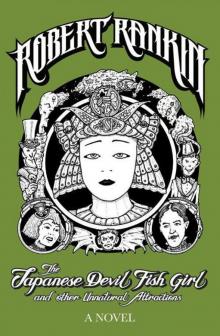 The Japanese Devil Fish Girl and Other Unnatural Attractions
The Japanese Devil Fish Girl and Other Unnatural Attractions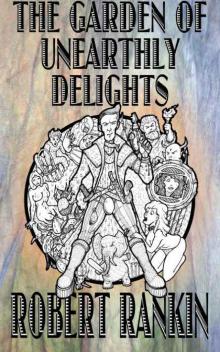 The Garden of Unearthly Delights
The Garden of Unearthly Delights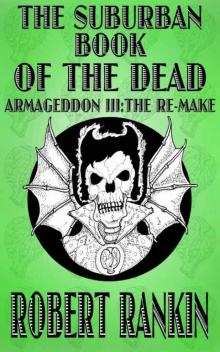 The Suburban Book of the Dead: Armageddon III: The Remake
The Suburban Book of the Dead: Armageddon III: The Remake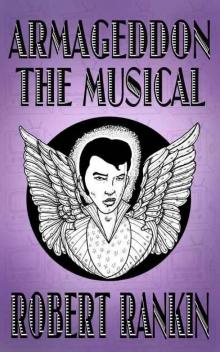 Armageddon_The Musical (Armageddon Trilogy Book 1)
Armageddon_The Musical (Armageddon Trilogy Book 1)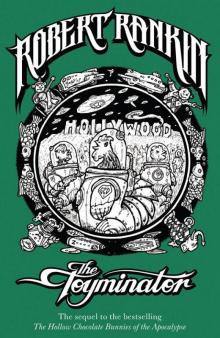 The Toyminator
The Toyminator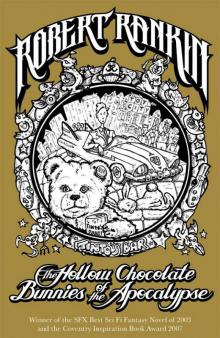 The Hollow Chocolate Bunnies of the Apocalypse
The Hollow Chocolate Bunnies of the Apocalypse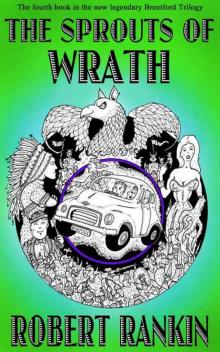 The Sprouts of Wrath
The Sprouts of Wrath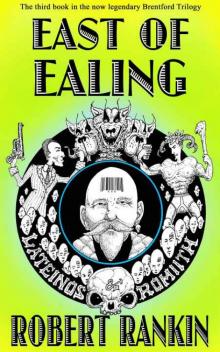 East of Ealing
East of Ealing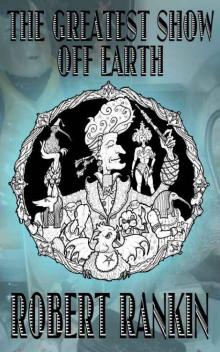 The Greatest Show Off Earth
The Greatest Show Off Earth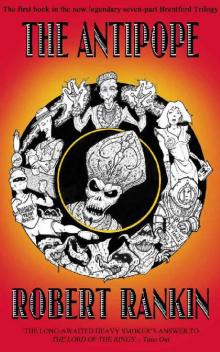 The Antipope
The Antipope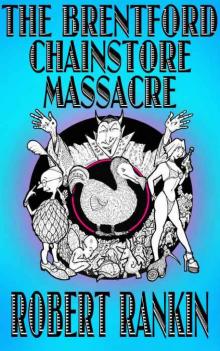 The Brentford Chainstore Massacre
The Brentford Chainstore Massacre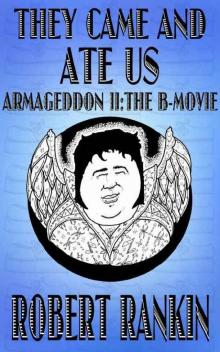 They Came and Ate Us_The B-Movie (Armageddon Trilogy 2)
They Came and Ate Us_The B-Movie (Armageddon Trilogy 2)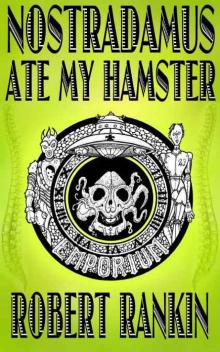 Nostradamus Ate My Hamster
Nostradamus Ate My Hamster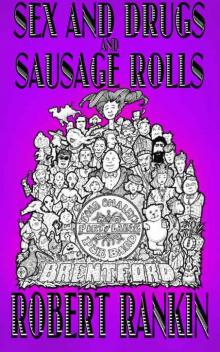 Sex and Drugs and Sausage Rolls
Sex and Drugs and Sausage Rolls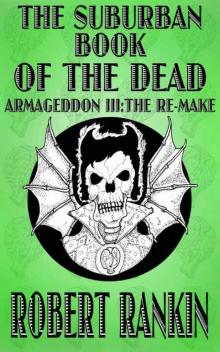 The Suburban Book of the Dead_The Remake (Armageddon Trilogy 3)
The Suburban Book of the Dead_The Remake (Armageddon Trilogy 3)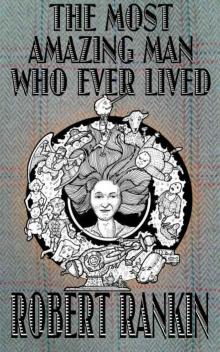 The Most Amazing Man Who Ever Lived
The Most Amazing Man Who Ever Lived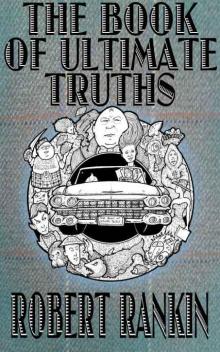 The Book of Ultimate Truths
The Book of Ultimate Truths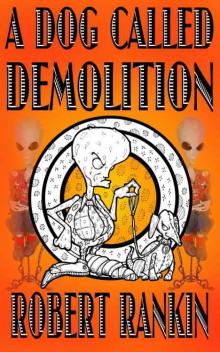 A Dog Called Demolition
A Dog Called Demolition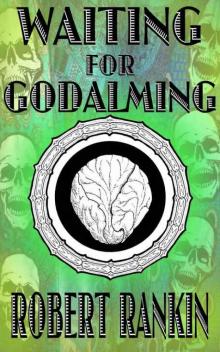 Waiting for Godalming
Waiting for Godalming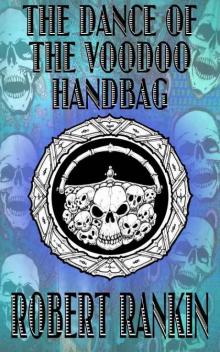 The Dance of the Voodoo Handbag
The Dance of the Voodoo Handbag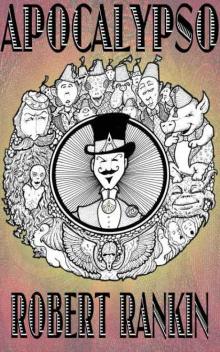 Apocalypso
Apocalypso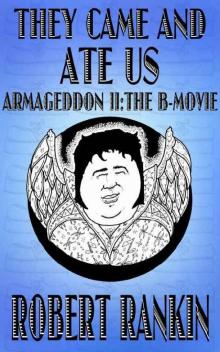 They Came and Ate Us: Armageddon II: The B-Movie
They Came and Ate Us: Armageddon II: The B-Movie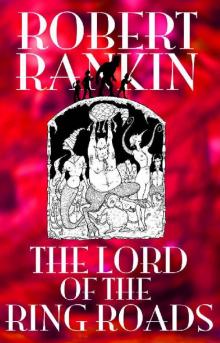 The Lord of the Ring Roads
The Lord of the Ring Roads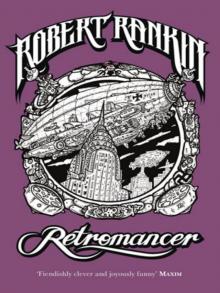 Retromancer
Retromancer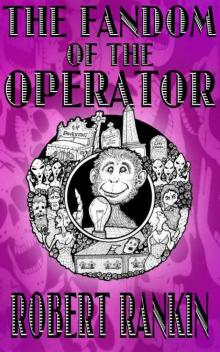 The Fandom of the Operator
The Fandom of the Operator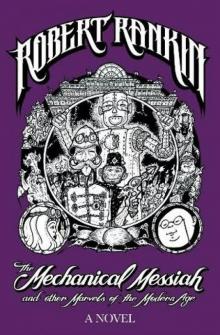 The Mechanical Messiah and Other Marvels of the Modern Age
The Mechanical Messiah and Other Marvels of the Modern Age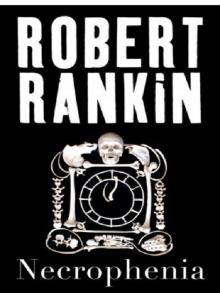 Necrophenia
Necrophenia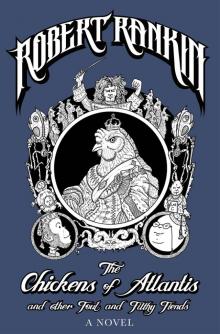 The Chickens of Atlantis and Other Foul and Filthy Fiends
The Chickens of Atlantis and Other Foul and Filthy Fiends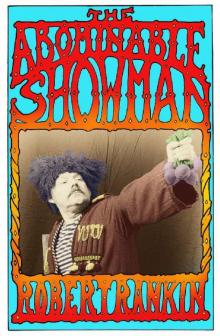 The Abominable Showman
The Abominable Showman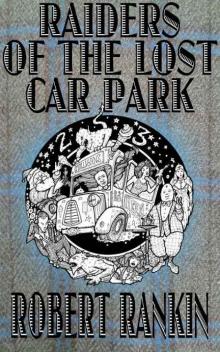 Raiders of the Lost Carpark
Raiders of the Lost Carpark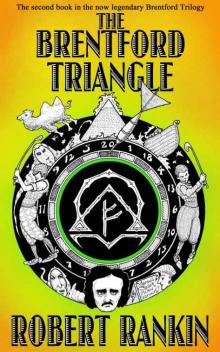 The Brentford Triangle
The Brentford Triangle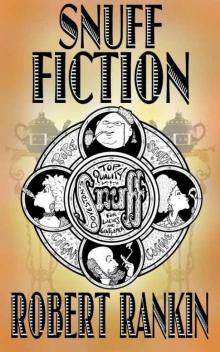 Snuff Fiction
Snuff Fiction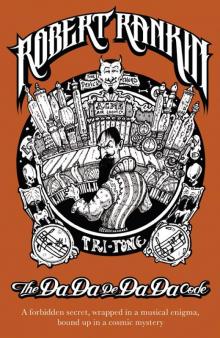 The Da-Da-De-Da-Da Code
The Da-Da-De-Da-Da Code Web Site Story
Web Site Story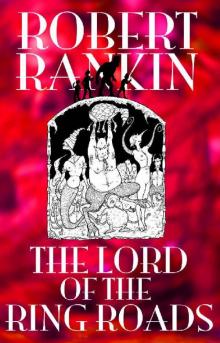 The Lord of the Ring Roads (The Final Brentford Trilogy Book 1)
The Lord of the Ring Roads (The Final Brentford Trilogy Book 1)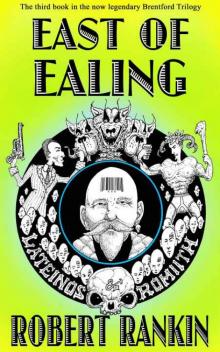 East of Ealing (The Brentford Trilogy Book 3)
East of Ealing (The Brentford Trilogy Book 3)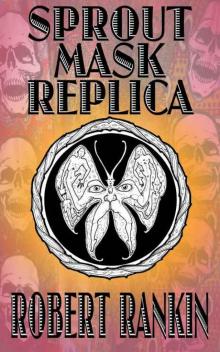 Sprout Mask Replica (Completely Barking Mad Trilogy Book 1)
Sprout Mask Replica (Completely Barking Mad Trilogy Book 1)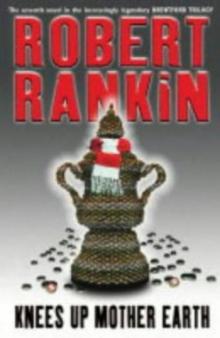 Knees Up Mother Earth bs-7
Knees Up Mother Earth bs-7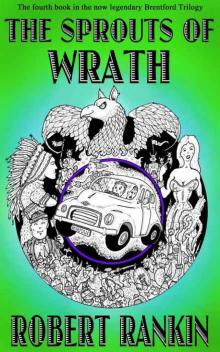 The Sprouts of Wrath (The Brentford Trilogy Book 4)
The Sprouts of Wrath (The Brentford Trilogy Book 4)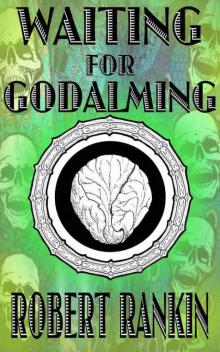 Waiting for Godalming (Completely Barking Mad Trilogy Book 3)
Waiting for Godalming (Completely Barking Mad Trilogy Book 3)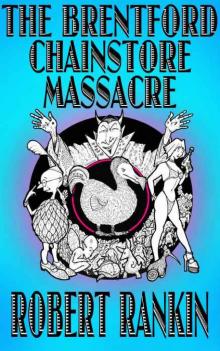 The Brentford Chainstore Massacre (The Brentford Trilogy Book 5)
The Brentford Chainstore Massacre (The Brentford Trilogy Book 5)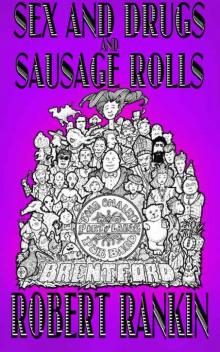 Sex and Drugs and Sausage Rolls (The Brentford Trilogy Book 6)
Sex and Drugs and Sausage Rolls (The Brentford Trilogy Book 6)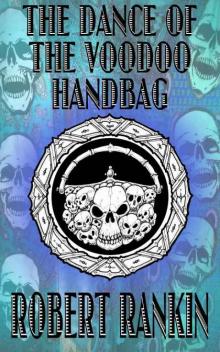 The Dance of the Voodoo Handbag (Completely Barking Mad Trilogy Book 2)
The Dance of the Voodoo Handbag (Completely Barking Mad Trilogy Book 2)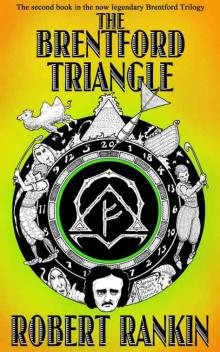 The Brentford Triangle (The Brentford Trilogy Book 2)
The Brentford Triangle (The Brentford Trilogy Book 2)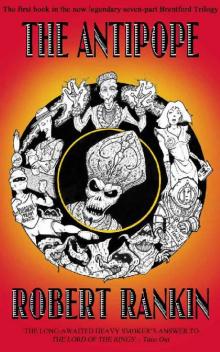 The Antipope (The Brentford Trilogy Book 1)
The Antipope (The Brentford Trilogy Book 1)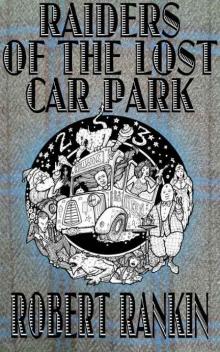 Raiders of the Lost Car Park (The Cornelius Murphy Trilogy Book 2)
Raiders of the Lost Car Park (The Cornelius Murphy Trilogy Book 2)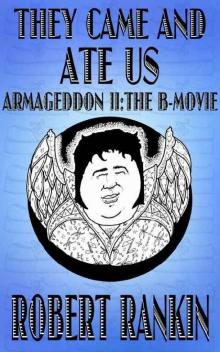 They Came and Ate Us - Armageddon II_The B-Movie (Armageddon Trilogy Book 2)
They Came and Ate Us - Armageddon II_The B-Movie (Armageddon Trilogy Book 2)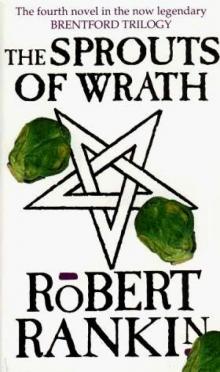 The Sprouts of Wrath bs-4
The Sprouts of Wrath bs-4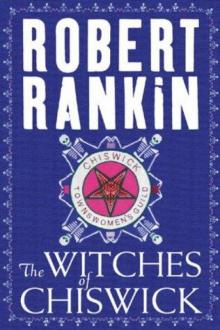 The Witches of Chiswick
The Witches of Chiswick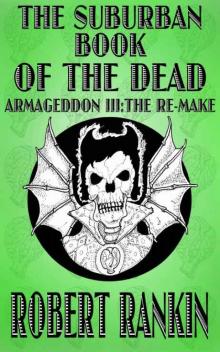 The Suburban Book of the Dead - Armageddon III: The Remake (Armageddon Trilogy 3)
The Suburban Book of the Dead - Armageddon III: The Remake (Armageddon Trilogy 3)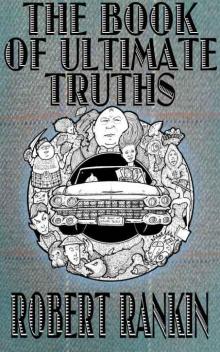 The Book of Ultimate Truths (The Cornelius Murphy Trilogy 1)
The Book of Ultimate Truths (The Cornelius Murphy Trilogy 1)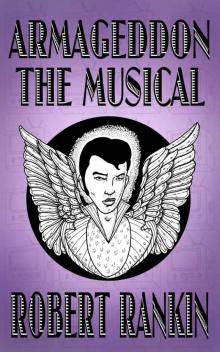 Armageddon: The Musical (Armageddon Trilogy)
Armageddon: The Musical (Armageddon Trilogy)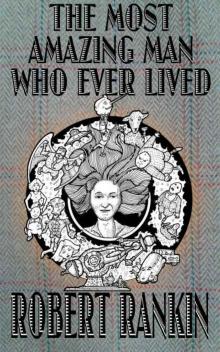 The Most Amazing Man Who Ever Lived (The Cornelius Murphy Trilogy Book 3)
The Most Amazing Man Who Ever Lived (The Cornelius Murphy Trilogy Book 3)